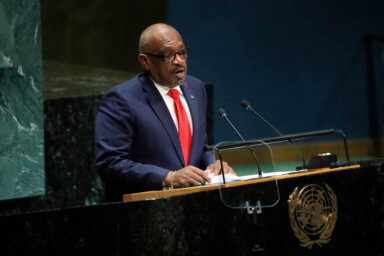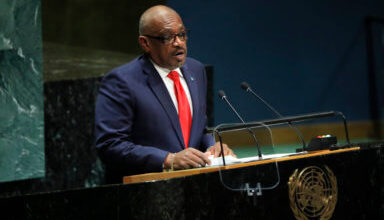Caribbean RoundUp

Bermuda
Prime Minister David Burt recently said that his administration is on course to return a balanced budget this year.
While delivering the pre-budget report to legislators, Burt said his administration is also considering other concessions for Bermudians given the encouraging current financial situation and that he has no plans to introduce any tax increases in the 2025-26 financial year, but there will be proposed cuts in taxes, duties, and fees on a range of items, including energy, building materials, land tax, and vehicle licenses.
Burt said that next year, a universal healthcare system will finally be launched to drive down healthcare costs, promising also a boost in capital expenditure, which will be used to build more affordable homes and other infrastructure projects.
He said the concessions will be financed in part by an expected US$187 million boost to the economy from the corporate income tax, which is expected to be introduced next year. The net result of predicted revenue and expenditure will be a budget surplus of US$84 million.
“These measures are designed with fairness at their core. They focus on the areas that touch every Bermudian’s life: energy, housing, transportation, and connectivity.
“Each of these initiatives reflects this Government’s understanding of the real challenges faced by our people and our determination to provide meaningful relief to taxpayers,” Premier Burt said, adding, “I wish to affirm my sincere expectation that 2025 will be a transformative year in Bermuda.”
“With the first revenue collections from the corporate income tax, we will not only deliver relief but also make strategic investments to ensure long-term prosperity and set Bermuda on a path to repay its national debt.”
Caribbean
The Pan American Health Organization (PAHO) has reported on three transmissible diseases affecting the region, including dengue, Oropouche, and avian influenza (H5N1).
In a recent news release, PAHO director Dr. Jarbas Barbosa expressed concern over the increase in cases in 2024 but emphasized effective strategies to control the outbreaks and mitigate their impact.
It said the region has faced the largest dengue epidemic this year since records began in 1980. Countries have reported more than 12.6 million cases, nearly three times more than in 2023, and over 7,700 deaths.
“Dengue is posing higher than normal risk to children. In countries like Guatemala, 70% of dengue-related deaths have occurred in children,“ Barbosa said during a press conference in Washington DC, highlighting that children under 15 represent over a third of severe cases in countries like Costa Rica, Mexico, and Paraguay.
The PAHO director said the situation is linked to climate events favoring mosquito proliferation, as well as to unplanned urbanization, accumulated water around the home, and poor waste management, which create breeding grounds for the vector.
PAHO has also observed an increase in cases of the Oropouche virus, transmitted by infected midges and some mosquito species. In 2024, more than 11,600 cases have been reported in 12 countries and territories in the region, mainly in Brazil.
“Although the Oropouche outbreak is on a much smaller scale than dengue, it requires our attention due to its increasing geographic spread outside the Amazon Basin, including in areas with no prior history of the disease,“ Barbosa said.
“Countries must strengthen their surveillance and continue sharing information. We must work across borders to monitor new cases and support health systems to respond,“ he said.
Regarding the H5N1 virus, also known as avian influenza, Barbosa said that while the number of human cases is moderate, the public health impact remains limited.
He said, “In 2024, 58 human cases have been reported in the United States and one in Canada. This contrasts with the three cases reported in the previous two years for the entire region.”
H5N1 is a virus commonly found in birds but now infects other species, such as dairy cattle in the United States. This year, 19 countries in the Americas have ported H5N1 cases in animals, and two of those countries have confirmed human cases.
Barbosa said surveillance is key to tracking the virus and understanding its evolution.
Haiti
United Nations Secretary-General Antonio Guterres strongly condemned the violence and killings in Haiti, where an armed gang is reported to have killed at least 184 people recently.
UN Secretary-General spokesman, Stéphane Dujarric, said that the killings occurred between Dec. 6-8 in the Wharf Jérémie neighborhood in Cité Soleil and that the Secretary-General “expresses his deepest sympathy and condolences to the families of the victims of this horrific act.
“The Secretary-General calls on the Haitian authorities to conduct a thorough investigation and ensure that perpetrators of these and all other human rights abuses and violations are brought to justice.”
Dujarric said that the Secretary-General reiterates his pressing call to member states to provide the Kenya-led Multinational Security Support (MSS) mission with the financial and logistical support required to successfully assist the Haitian National Police in addressing gang violence.
“He also calls on all Haitian stakeholders to accelerate progress in the political transition,“ he added.
The National Human Rights Defense Network (RNDDH) in Haiti said that the killings were allegedly the result of revenge by Micanor Altes alias “Wa Mikano,” leader of the Wharf Jeremie gang.
Guyana
President Irfaan Ali has announced a 10% retroactive salary increase for all public servants and people with academic qualifications will also benefit financially from January 2025.
Ali, speaking at a breakfast with officers of the Guyana Police Force (GPF), said the public servants will also receive an 8% increase in salaries next year and that these new wage packages follow talks with the Guyana Public Service Union (GPSU).
“This 10% increase in salary, which is retroactive from Jan. 1, 2024, will amount to 35% cumulative salary increase over the last four years,“
Ali added, “Further, we’ve been able to bring to the union that 2025 will also see an increase in the salary of public servants of eight percent.”
Ali said, in addition, that the government will work on various salary scale adjustments from next year in a move to guarantee that the workers take home more money monthly.
He added that qualification allowances would also be introduced on Jan. 1 and that individuals with qualifications from the Association of Chartered Certified Accountants (ACCA) will also receive a monthly allowance of GUY $15,000.
Ali said persons with a Master’s Degree will get GUY $22,000 monthly, while those with a doctoral degree will receive GUY $32,000 monthly.
Ali said eligible health workers would get a GUY $5,000 annual increase in uniform allowances and GUY $10,000 for public servants.
There would also be a monthly housing allowance of GUY $35,000 for public servants on secondment transfer to hinterland locations from Jan. 1. In addition, there would be a GUY$8,000 station allowance for public servants serving in certain riverain and hinterland areas and a 50% increase in risk allowance, and a 104% increase in motor car and travel allowances.
Ali said the government would grant 100 duty-free concessions annually for staff nurses and above, with “priority given to persons with the longest years of service and those who have never benefitted from a duty-free concession.“
“This would ensure that the criteria for those who are granted the duty-free also serve the time, which is five years and three years, so it is an incentive for the retention of our nurses also,“ he said, adding, “From this announcement, you can see this government’s commitment to every category of people of our country is unquestionable.”
Jamaica
Health authorities told Jamaicans that every effort is being made to mitigate the impact of junior doctors’ industrial action on the health system. They acknowledged that health facilities islandwide have begun to operate under emergency protocols.
“This means that while emergency room services and elective surgeries have been significantly scaled down or otherwise suspended. Primary care facilities (health centers) have also been affected.
“So far today, there has been a reported 16% doctor turnout in primary care in the Western Regional Health Authority and 28% in the North East Regional Health Authority,“ the Ministry of Health and Wellness said in a statement.
“The Southern Regional Health Authority has reported a 36 per cent turnout while Kingston and St Andrew have reported an 18 % turnout and St. Thomas, 66 %, also in primary care. At the same time, there are some primary care and secondary care facilities that have reported as high as 100 % no-show for their junior doctors.“
The junior doctors have heeded the call of the Jamaica Medical Doctors Association (JMDA) representative, who has detailed grievances that it says have persisted for 20 months.
According to the JMDA, these include the government’s failure to address retroactive payments for owed overtime, the unilateral removal of incentive allowances, and the imposition of new overtime rates contrary to previous agreements. The medical practitioners also accuse the government of refusing to reinstate the discontinued incentive allowances, deepening the rift between the parties.
The doctors said the protest serves as a message of solidarity while acknowledging doctors’ critical role in the health system.
In its statement, the ministry said that every effort is being made to mitigate the impact of these actions on the health system, with plans to reschedule elective procedures and outpatient appointments at hospitals and clinics at health centers.
St. Vincent and the Grenadines
The St. Vincent and the Grenadines parliament has approved legislation targeting dog owners who are not honoring their duties and responsibilities.
The Dog Bill 2024 provides penalties for various offenses, including taking dogs to certain beaches, causing the animal to escape from one’s property, and not cleaning up after the pet when it defecates in a public place.
“If you wish to be a dog owner, there are responsibilities, and buying the dog or accepting a dog as a gift is just a start. After that, it is your dog, and you have to be responsible,“ Minister of Agriculture Saboto Caesar said.
“There are some persons who own dogs, and when they go to the beach, they will take the dog to the beach, and it is a nuisance.
“We have all been to the beach before and seen someone walking towards you, your family with a dog. And persons have to either run in the water, persons have to remove themselves from the beach. We must bring a stop to this,“ Caesar said.
The bill was passed without debate or opposition, and he added that one of the main objectives of the law is to regulate dogs on beaches.
Under the new law, by an order published in the Gazette, the government will list some beaches where people cannot take dogs.
Compiled by Devika Ragoonanan





